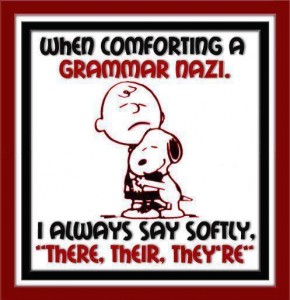Bad Grammar
Let’s face it: many of us were spaced out during grade school English classes. I know I was more concerned if I had pizza stuck in my braces after lunch than whether or not I knew what an “unclear antecedent” was.
Now, we all have a Grammar Nazi in our lives. I’m talking about the people who are perhaps teachers, or mentors, or friends, or colleagues, who can’t help but correct any grammar mistake you make.
I came upon GN’s when I began my MFA program in Creative Writing. If a Grammar Nazi would correct a misused semicolon, I would graciously smile and thank them, even though their faces displayed disgust; I am not exaggerating. People who make grammatical errors are the worst scum of the earth—according to the GN’s. Because of this ugly behavior, I decided to ignore them, and hire an editor. Editors are mostly nice GN’s, if they are getting paid. They gently tell you that you keep putting a comma after the word “but,” instead of before. However, there are always those damn exceptions to the rules.
Lately, I have been siding with the GN’s because they have many valid points, and I am running out of money for the editors.
For example:
1) A writer should have command of how to correctly punctuate because, well, they are writers!
2) They should want their words to come across as clearly as they intended. A misplaced word or incorrect punctuation mark can change the meaning of your work.
3) If you call yourself a writer, then have the correct tools. An electrician would not show up at your house with a fork instead of a screwdriver. Not only would he look stupid, but someone might get hurt.
4) When a writer works on revisions, how can he revise if he doesn’t know what needs revising?
And now, even though I still believe the idea and the message in a piece of creative writing are of the utmost importance, I see the value in investing in a book like The Elements of Style by Strunk and White, or, at the very least, Grammar for Dummies. Nevertheless, I want to thank the GN’s because I no longer mistake “then” for “than,” or write “effect” when I mean “affect,” or forget it’s a contraction when I write “your” and mean “you’re.”
By the way, an “unclear antecedent” is a noun that existed before, but now you are replacing it with a pronoun, and you are not being clear about it. Clear about the noun, that is. Here is an example of an unclear antecedent: He said he liked it, but my editor wanted to clarify a few things. Who is he? It is unclear. If it is the editor, then write: The editor liked it, but he asked me to clarify a few things.
My editor asked me to clarify if I agreed that a writer must care about grammar. Yes, I agreed, a writer must care. However, if you are a Grammar Nazi, and you correct a fellow writer’s bad grammar, be nice. Would you, please? We had enough trauma and suffering during middle school.
Andrea Tate is a monthly blogger for Lunch Ticket. She has been published in Role/Reboot, A Daily Dose of Lit, Bleed, Odyssey, and Acorn. Her story “You” was published in the 2013 anthology for Extracts. Andrea has served as a Creative Nonfiction Editor and Assistant Editor for Lunch Ticket. This year she will teach the online course for AULA Let’s Get Personal—How to Write a Personal Essay. An advocate for theatre arts, Andrea directs as well as teaches after-school enrichment in the greater Los Angeles area. Email her at andreatate(at)me.com
after-school enrichment in the greater Los Angeles area. Email her at andreatate(at)me.com







